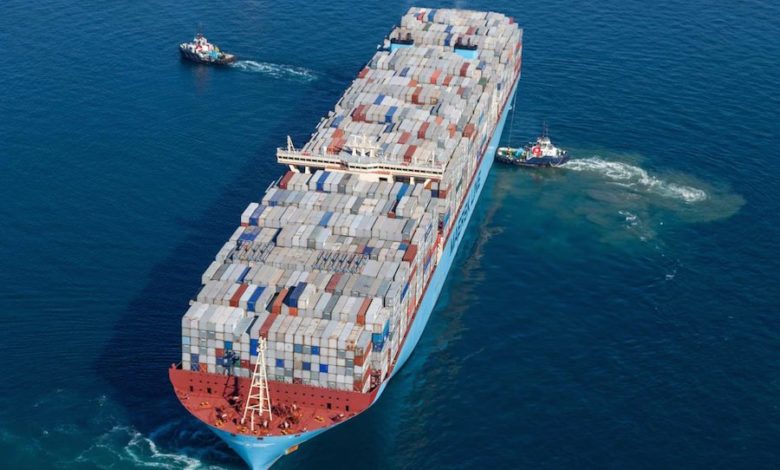Maersk and IBM team up on ‘transformative’ blockchain technology

Maersk is making blockchain a reality for shipping. The Danish conglomerate has teamed up with IBM for a new initiative which the pair claim in a release could “transform the global, cross-border supply chain”.
The blockchain solution based on the Hyperledger Fabric and built by IBM and Maersk will be made available to the shipping and logistics industry. The solution will help manage and track the paper trail of tens of millions of shipping containers across the world by digitising the supply chain process from end-to-end in order, the pair claim, to enhance transparency and the secure sharing of information among trading partners. When adopted at scale, the solution has the potential to save the industry billions of dollars, IBM and Maersk maintained.
IBM and Maersk intend to work with a network of shippers, freight forwarders, ocean carriers, ports and customs authorities to build the new global trade digitisation solution, which is expected to go into production later this year.
“As a global integrator of container logistics with the ambition to digitise global trade, we are excited about this cooperation and its potential to bring substantial efficiency and productivity gains to global supply chains, while decreasing fraud and increasing security,” said Ibrahim Gokcen, chief digital officer, Maersk. “The projects we are doing with IBM aim at exploring a disruptive technology such as blockchain to solve real customer problems and create new innovative business models for the entire industry. We expect the solutions we are working on will not only reduce the cost of goods for consumers, but also make global trade more accessible to a much larger number of players from both emerging and developed countries.”
The costs associated with trade documentation processing and administration are estimated to be up to one-fifth the actual physical transportation costs. A single vessel can carry thousands of shipments, and on top of the costs to move the paperwork, the documentation to support it can be delayed, lost or misplaced, leading to further complications.
Blockchain, an immutable, security rich and transparent shared network, provides each participant end-to-end visibility based on their level of permission.
Each participant in a supply chain ecosystem can view the progress of goods through the supply chain, understanding where a container is in transit. They can also see the status of customs documents, or view bills of lading and other data.
Detailed visibility of the container’s progress through the supply chain is enhanced with the real time exchange of original supply chain events and documents.
No one party can modify, delete or even append any record without the consensus from others on the network.
This level of transparency helps reduce fraud and errors, reduce the time products spend in the transit and shipping process, improve inventory management and ultimately reduce waste and cost.
The solution enables the real time exchange of original supply chain events and documents through a digital infrastructure, or data pipeline, that connects the participants in a supply chain ecosystem.
“We believe that this new supply chain solution will be a transformative technology with the potential to completely disrupt and change the way global trade is done,” said Bridget van Kralingen, senior vice president at IBM. “Working closely with Maersk for years, we’ve long understood the challenges facing the supply chain and logistics industry and quickly recognised the opportunity for blockchain to potentially provide massive savings when used broadly across the ocean shipping industry ecosystem. Bringing together our collective expertise, we created a new model the industry will be able to use to help improve the transparency and efficiency of delivering goods around the globe.”
The solution developed by Maersk and IBM is based on the open source Linux Foundation’s open source Hyperledger Fabric. The solution is expected to be widely available to support multiple parties across the ocean shipping industry ecosystem later this year. IBM hosts the solution on the IBM Cloud and the IBM high-security business network, delivered via IBM Bluemix.
Commenting on the news, KD Adamson, founder of Futurenautics, told Splash today that 2017 was shaping up as the year when platforms and ecosystems emerge that would shape shipping’s future.
Maersk and IBM’s announcement along with HSBC and Bank of America’s recent trade finance blockchain point to a big shift in global trade, she said.
“Blockchain as an underlying technology is important, but what it’s delivering is transparency, security and automated trust via a distributed digital ecosystem, and that’s strategically key,” Adamson told Splash, adding: “Blockchain, if it can be adequately scaled, enables autonomous smart contracts and is the foundation for smart regulation for shipping—both will be profoundly disruptive.”

There were early predictions that blockchain technology would likely disrupt those industries practising archaic work procedures and paper-driven work routines, so it’s good to read that Maersk is at an advanced stage, of making blockchain a reality, to reduce inefficiencies across the container supply chain. On the banking front, many of the large trade finance banks have been learning and conducting pilot projects on distributed ledger technology for at least 2-3 years. Recent IBM research reveals that the banks will continue to launch more blockchain payment solutions, although mass adoption of the technology may be some years away for the shipping industry.
A case in point is a recent headline in The Loadstar: “Shipping Lines Reluctant to Go Digital in Blockchain Tech Revolution.” The story refers to blockchain technology, developed by Maritime Transport International, called SolasVGM, which records verified gross mass (VGM) to meet new regulations. One of the first customers to adopt the system for transmitting VGM data found some shipping lines were reluctant to allow their shippers to use the technology; they wanted them to use independent platforms thus undermining the benefits of EDI for transmitting the VGM data.